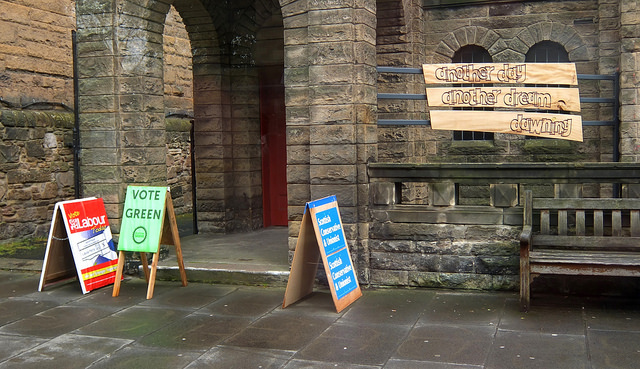Whither the Union? Scotland’s voice prompts more questions than answers
After Scotland’s big decision, thoughts have moved to the future and implications that are far-reaching for the whole of the Union. Carl Cullinane rounds up the reaction and tries to pick apart what it all means for UK democracy.

Scotland Wakes Up (Credit: kaysgeog, CC BY NC ND 2.0)
Elections can often be similar to the old fable of the blind men and the elephant, with differing perspectives taking vastly different lessons from the same experience. Scotland’s independence referendum has been no different. As London, Edinburgh, and the rest of the Union slowly woke up to the morning after the night before, there have been as many angles as there are people keen to express their opinion.
Some, including those who ran extensive, engaging and outstandingly dedicated live blogs, the LSE and UEA in particular among them, may have barely woken up at all. But for the rest of us, the morning after has been dominated by issues from polling error, demographic and turnout analysis and mathematical modelling, all the way to constitutional reform, the future of Westminster MPs and whether this month has marked a new wave of popular participation.
Looking back, to understand what happened yesterday and what it could mean is an essential ingredient. Stephen Fisher has provided an excellent statistical analysis of the trends from yesterday’s voting patterns and how it feeds into understanding what the Scottish electorate had to say. While the Yes campaign mobilised significantly increased turnout in lower class areas, in turn the tightness of the race and the importance of the poll spurred huge turnout in more affluent areas, ultimately leaving the ‘Yes’ vote negatively correlated with areas of higher turnout, in contravention of popular assumption in the lead up. John McDermott of the Financial Times has also reacted to the outcome of what has been a unique event for polling analysis, and FiveThirtyEight’s Carl Bialik has been analysing the relative success of the prediction models.
But nonetheless, with a strong ‘No’ win all but a foregone conclusion since the early hours of Friday, by the morning, most thoughts had turned to the future. The predominant refrain has been that ‘The status quo is not an option’, which has rung around every corner of the still-standing Union. David Cameron himself spared no time before outlining his intentions and putting in motion plans for significant constitutional reform, with Matthew Flinders identifying Lord Smith of Kelvin and William Hague at the centre of this process.
The Prime Minister risked the wrath of those accusing Westminster politics of myopia by indulging in the southern-centric messaging that provoked the almost-dissolution of the Union in the first place, declaring; “I have long believed that a crucial part missing from this national discussion is England. We have heard the voice of Scotland and now the millions of voices of England must also be heard.” While possibly inadvisably blunt, he is undoubtedly correct that last night’s result will have far-reaching implications for England, and much of the coverage this morning has reflected that, focusing on ‘the English Question’ highlighted in Cameron’s speech, and the prospects for a more generally agreeable renewal of the Union.
It has quickly become clear that this is unlikely to be plain sailing. The Better Together campaign may have ultimately prevailed in the Ingliston count centre, but at what cost to the Westminster protagonists? The dramatic polls indicating that ‘Yes’ may have moved ahead in the weeks before the referendum date lead to a wave of love-bombing from the three main parties, with Cameron, Clegg, Miliband, and even Gordon Brown making a variety of hefty promises to Scottish voters in return. David Cameron may have avoided becoming possibly the most notorious Prime Minister in UK democratic history, but he may live to rue September 2014 yet.
Ian Dunt has emphasised that domino effect of that incendiary YouGov poll, triggering the Westminster leadership’s lavish offers to Scotland, and in turn leading to the myriad of calls within the political establishment for English democracy in return. Cameron’s plans for Scotland, both in terms of devolution, and in terms of funding, are likely to face immediate pushback from English and Welsh MPs, with Peter Hain MP already opining that “You can’t keep giving all the goodies to Scotland simply because they shout the loudest.” Balancing delivery on hasty promises to Scotland with the demands of the rest of the UK, with a General Election less than a year away, will be a tricky task indeed.
Widely recognised also has been that the consequences of the referendum and its campaign do not merely apply to the political classes, but the wide and diverse engagement that emerged now has the potential for a transformative effect on British democracy. Nick Pearce of the IPPR has urged that “this energy and momentum cannot be allowed to dissipate. It must now be channeled into a process for wider democratic renewal”. He also, in common with many commentators and government critics, warns against ‘constitution making on the hoof’, the answer to which may come in popular participation itself.
The passion and engagement of the Scottish referendum on both sides of the border has sparked widespread optimism about the short-term future for a more inclusive politics. Voices now abound calling for a Constitutional Convention, where the UK public could shape the its own constitutional future. The Electoral Reform Society and Polly Toynbee led these clarion calls before the election and during the BBC coverage during election night, and Unlock Democracy have begun a popular campaign to urge the UK to follow in the footsteps of Ireland and Iceland’s recent conventions. Suggestions that Labour are now committed to such an idea are an encouraging first step, while it has also drawn support from the perhaps unlikely source of Nigel Farage. Though the UKIP leader’s public request for Scottish MPs to voluntarily refrain from voting on English matters is possibly less welcome.
Nonetheless, regardless of how reform is decided, there remain major issues for its execution. While many have called for the adoption of a new federal model for the UK, this is far from straightforward. The relative size of England remains highly problematic to any proposed federal structure, with Adam Tomkins emphasising on the Democratic Audit earlier this month that any English parliament would “immediately rival the House of Commons for political supremacy. Who would be the more powerful: England’s First Minister or the Prime Minister of the UK?”
Along with the hitherto largely obscure ‘Barnett Formula’, the last few weeks has also seen a resurgence of the so-called ‘West Lothian question’, indeed so-called by Enoch Powell, as the New Statesman’s historical account of the issue explains. A separately elected English parliament may be cumbersome and unwise, but any reform of Westminster voting rights instead would need to finally address Tam Dalyell’s question. While Cameron’s speech this morning has indicated that this is his preference, George Eaton has pointed out that underlying the Conservatives’ drive for creating separate classes of MPs may be a certain amount of self-interest: “The Tories are keenly aware that denying Scottish, Welsh and Northern Irish MPs the right to vote on English-only legislation could leave future Labour governments in office but not in power, handing the Conservatives an effective veto.” This likely reality puts Ed Miliband and the Labour party in a difficult position indeed.
Finally, what about Scotland itself? Now promised a wide range of devolution measures, will this quell the desire for independence? Despite their eventual defeat, the incredibly strong showing for the ‘Yes’ side should not be underestimated, achieving a broad-based and passionate coalition that could hardly have been imagined a matter of months ago. However, Newsnight’s Chris Cook has warned that this may have been Scotland’s best opportunity for independence, and that economic winds, particularly influenced by dwindling oil reserves and ageing Scottish demography, are prevailing strongly against a movement towards future independence.
On the contrary, the LSE’s Patrick Dunleavy has warned of ‘constitutional turbulence’ for years ahead. Should the Conservative Party gain a majority in next year’s Westminster elections, there will be a referendum on exiting the European Union. Should this be passed, Prof. Dunleavy suggests that Scotland would propose an almost immediate independence re-run, as the political landscape and available options will have changed so radically.
It seems that regardless of the result last night, there are rocky times ahead. Scotland were asked for their voice, and they made themselves heard, but for the UK as a whole, the result has posed more questions than answers.
—
Note: this post represents the views of the author and not those of Democratic Audit or the LSE. Please read our comments policy before posting.
—
 Carl Cullinane is Research Assistant at the Democratic Audit, and is responsible for conducting in-house research along with contributing to the blog and other DA outputs. He holds a degree in Philosophy and Political Science from Trinity College Dublin in 2005, along with MSc’s in Philosophy & Public Policy from the LSE and Applied Social Research, also from Trinity College.
Carl Cullinane is Research Assistant at the Democratic Audit, and is responsible for conducting in-house research along with contributing to the blog and other DA outputs. He holds a degree in Philosophy and Political Science from Trinity College Dublin in 2005, along with MSc’s in Philosophy & Public Policy from the LSE and Applied Social Research, also from Trinity College.
He has worked for the Irish Ombudsman for Children, the Economic and Social Research Institute, and NatCen Social Research. He joined the Democratic Audit in Summer 2014, and can be found on twitter at @cullinanecarl





 Democratic Audit's core funding is provided by the Joseph Rowntree Charitable Trust. Additional funding is provided by the London School of Economics.
Democratic Audit's core funding is provided by the Joseph Rowntree Charitable Trust. Additional funding is provided by the London School of Economics.
Helpful #Indyref round up by @CullinaneCarl @democraticaudit with links to useful resources https://t.co/BIX49hoCCG
Whither the Union? Scottish Referendum Round Up, by @cullinanecarl https://t.co/RVEJARxz2z https://t.co/pJ8JxNReur
Referendum round up, the morning after the night before: https://t.co/sokmhLdEiv
Two things: My attempt to pick apart the issues raised by #indyref : https://t.co/y5y13qUepG And a map of turnout: https://t.co/hDbiNjoziv
Scotland’s voice prompts more questions than answers: #Indyref Round up by @cullinanecarl: https://t.co/nnzJXcYBtr https://t.co/nTPauzBfWJ
Fading badly, but I have written a piece rounding up today’s reactions to #indyref: https://t.co/y5y13qUepG
Whither the Union? Scotland’s voice prompts more questions than answers https://t.co/ZQcDLGKUk8
Whither the Union? Scotland’s voice prompts more questions than answers https://t.co/7F8eIgT3S0
RT “@democraticaudit: Scotland’s voice prompts more questions than answers: #Indyref Round up by @cullinanecarl: https://t.co/J0gdSalOSJ “